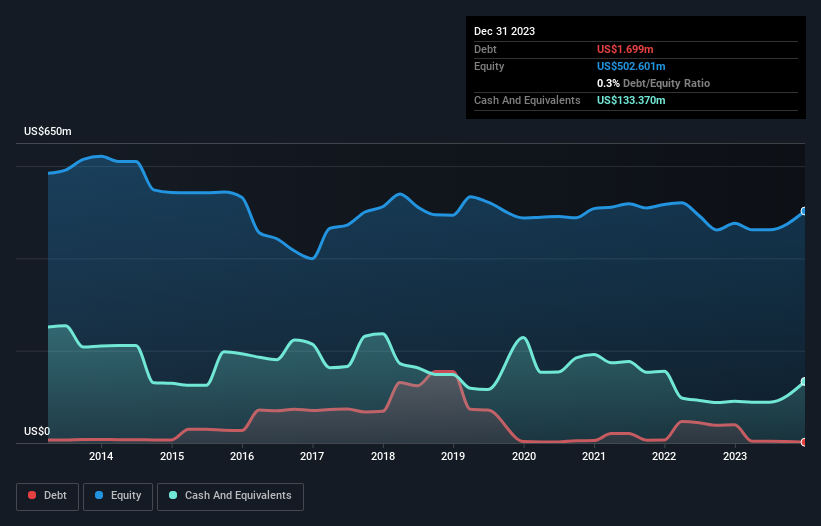
Some say volatility, rather than debt, is the best way to think about risk as an investor, but Warren Buffett famously said that 'Volatility is far from synonymous with risk.' So it seems the smart money knows that debt - which is usually involved in bankruptcies - is a very important factor, when you assess how risky a company is. We can see that NVC International Holdings Limited (HKG:2222) does use debt in its business. But is this debt a concern to shareholders?
When Is Debt Dangerous?
Debt assists a business until the business has trouble paying it off, either with new capital or with free cash flow. If things get really bad, the lenders can take control of the business. While that is not too common, we often do see indebted companies permanently diluting shareholders because lenders force them to raise capital at a distressed price. Of course, plenty of companies use debt to fund growth, without any negative consequences. When we examine debt levels, we first consider both cash and debt levels, together.
Check out our latest analysis for NVC International Holdings
What Is NVC International Holdings's Net Debt?
The image below, which you can click on for greater detail, shows that NVC International Holdings had debt of US$1.70m at the end of December 2023, a reduction from US$39.4m over a year. However, it does have US$133.4m in cash offsetting this, leading to net cash of US$131.7m.

How Strong Is NVC International Holdings' Balance Sheet?
The latest balance sheet data shows that NVC International Holdings had liabilities of US$79.2m due within a year, and liabilities of US$10.3m falling due after that. Offsetting this, it had US$133.4m in cash and US$62.9m in receivables that were due within 12 months. So it can boast US$106.8m more liquid assets than total liabilities.
This surplus liquidity suggests that NVC International Holdings' balance sheet could take a hit just as well as Homer Simpson's head can take a punch. With this in mind one could posit that its balance sheet means the company is able to handle some adversity. Simply put, the fact that NVC International Holdings has more cash than debt is arguably a good indication that it can manage its debt safely. The balance sheet is clearly the area to focus on when you are analysing debt. But you can't view debt in total isolation; since NVC International Holdings will need earnings to service that debt. So if you're keen to discover more about its earnings, it might be worth checking out this graph of its long term earnings trend.
In the last year NVC International Holdings had a loss before interest and tax, and actually shrunk its revenue by 14%, to US$236m. That's not what we would hope to see.
So How Risky Is NVC International Holdings?
Although NVC International Holdings had an earnings before interest and tax (EBIT) loss over the last twelve months, it made a statutory profit of US$36m. So when you consider it has net cash, along with the statutory profit, the stock probably isn't as risky as it might seem, at least in the short term. The next few years will be important as the business matures. When analysing debt levels, the balance sheet is the obvious place to start. But ultimately, every company can contain risks that exist outside of the balance sheet. We've identified 3 warning signs with NVC International Holdings , and understanding them should be part of your investment process.
If you're interested in investing in businesses that can grow profits without the burden of debt, then check out this free list of growing businesses that have net cash on the balance sheet.
Valuation is complex, but we're here to simplify it.
Discover if NVC International Holdings might be undervalued or overvalued with our detailed analysis, featuring fair value estimates, potential risks, dividends, insider trades, and its financial condition.
Access Free AnalysisHave feedback on this article? Concerned about the content? Get in touch with us directly. Alternatively, email editorial-team (at) simplywallst.com.
This article by Simply Wall St is general in nature. We provide commentary based on historical data and analyst forecasts only using an unbiased methodology and our articles are not intended to be financial advice. It does not constitute a recommendation to buy or sell any stock, and does not take account of your objectives, or your financial situation. We aim to bring you long-term focused analysis driven by fundamental data. Note that our analysis may not factor in the latest price-sensitive company announcements or qualitative material. Simply Wall St has no position in any stocks mentioned.
About SEHK:2222
NVC International Holdings
Engages in the manufacture and sale of lamps, luminaries, lamp transformers, lighting electronic products, and related products in China, the United States, Japan, the Netherlands, the United Kingdom, and internationally.
Good value with adequate balance sheet.
Market Insights
Community Narratives


